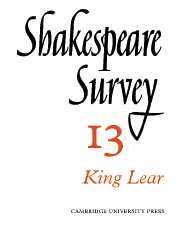Book contents
- Frontmatter
- The Catharsis of King Lear
- Lear’s Last Speech
- Albany
- Madness in King Lear
- The Influence of Gorboduc on King Lear
- Some Aspects of the Style of King Lear
- Keats and King Lear
- King Lear on the Stage: A Producer’s Reflections
- Costume in King Lear
- The Marriage-Contracts in Measure for Measure
- Tom Skelton—A Seventeenth-century Jester
- Illustrations of Social Life III: Street-Cries
- An Elizabethan Stage Drawing?
- Was there a Music-room in Shakespeare’s Globe?
- International Notes
- Shakespeare Productions in the United Kingdom: 1958
- Three Adaptations
- The Year's Contributions to Shakespearian Study 1 Critical Studies
- 2 Shakespeare’s Life, Times and Stage
- 3 Textual Studies
- Books Received
- Index
- Plate Section
The Catharsis of King Lear
Published online by Cambridge University Press: 28 March 2007
- Frontmatter
- The Catharsis of King Lear
- Lear’s Last Speech
- Albany
- Madness in King Lear
- The Influence of Gorboduc on King Lear
- Some Aspects of the Style of King Lear
- Keats and King Lear
- King Lear on the Stage: A Producer’s Reflections
- Costume in King Lear
- The Marriage-Contracts in Measure for Measure
- Tom Skelton—A Seventeenth-century Jester
- Illustrations of Social Life III: Street-Cries
- An Elizabethan Stage Drawing?
- Was there a Music-room in Shakespeare’s Globe?
- International Notes
- Shakespeare Productions in the United Kingdom: 1958
- Three Adaptations
- The Year's Contributions to Shakespearian Study 1 Critical Studies
- 2 Shakespeare’s Life, Times and Stage
- 3 Textual Studies
- Books Received
- Index
- Plate Section
Summary
The overriding critical problem in King Lear is that of its ending. The deaths of Lear and Cordelia confront us like a raw, fresh wound where our every instinct calls for healing and reconciliation. This problem, moreover, is as much one of philosophic order as of dramatic effect. In what sort of universe, we ask ourselves, can wasteful death follow suffering and torture? Nor is this concern an extrapolation from our own culture. It is, rather, implicit in Lear’s own image, when he calls for tongues and eyes to howl ‘That heaven’s vault should crack’ (v, iii, 259), and in his despairing question:
Why should a dog, a horse, a rat, have life,
And thou no breath at all?
(v, iii, 306–7)The problem becomes more overwhelming when we consider that, unlike the problems Shakespeare may have inherited with the plot of Hamlet, this tragic ending was imposed by Shakespeare on a story which, in its source, allowed Cordelia's forces to win the war. Moreover, the massive intrusion into King Lear of Christian elements of providence, depravity, and spiritual regeneration make it impossible to shunt aside the ending as a coincidence of its pre- Christian setting. The antiquity of setting may have had the irrelevant effect of releasing certain inhibitions in the playwright's mind; but the playgoers in Shakespeare's audience did not put on pagan minds to see the play. Rather, the constant references to retributive justice, perhaps greater here than in any other of Shakespeare's tragedies, make it an issue in a way that it is not in such 'pagan' plays as Timon of Athens, Antony and Cleopatra, and Coriolanus.
- Type
- Chapter
- Information
- Shakespeare Survey , pp. 1 - 10Publisher: Cambridge University PressPrint publication year: 1960
- 1
- Cited by



